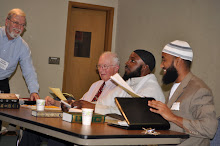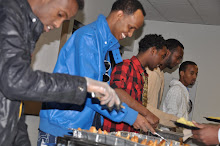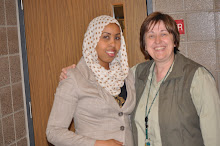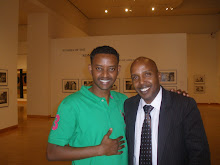
By Jane Laskey • jlaskey@stcloudtimes.com • October 24, 2008
SAUK RAPIDS — A graduation cap and gown often are the first step to good jobs, financial stability and independence. But 27 percent of Minnesota’s Class of 2007 did not graduate on time.
Almost 5,000 were listed as dropouts, according to the Minnesota Department of Education.
That’s a big problem.
High school dropouts are “much more likely than their peers who graduate to be unemployed, living in poverty, receiving public assistance, in prison, on death row, unhealthy, divorced and single parents with children who drop out from high school themselves” according to the 2006 report “The Silent Epidemic.”
While adult G.E.D. and diploma programs offer dropouts a chance to get back on track, that traditional approach often doesn’t work for adult learners with children.
That’s where the Sauk Rapids-Rice Family Literacy Program comes in. The unique program — a collaboration between Reach Up Inc., Sauk Rapids-Rice Adult Basic Education and Sauk Rapids-Rice Early Childhood Family Education — focuses on the entire family.
“It’s not just an adult education program to get a diploma. It looks at the needs of every person in that family,” Early Childhood Director Deb Campbell said. “They’re all in the same building, learning together.”
In 2008, 21 participants graduated from the program with a high school diploma.
Clearing a path
Life gets in the way for many dropouts who want to complete their degree. Providing food, shelter, clothes and diapers can consume a family’s resources. Affordable child care is hard to find. Transportation is not always available.
Katie Pattison, 29, of Sauk Rapids dropped out of high school when she became pregnant in 10th grade.
“I tried four or five times to go back — it didn’t ever last,” Pattison said.
The Family Literacy program eliminates the obstacles.
No car? No problem. Transportation is provided.
No sitter? No worries. Child care and school readiness classes are included so kids can come along with mom or dad.
No food in the fridge? Reduced or free lunches are served each day.
Best of all, the program itself is free.
For Pattison, the family component of the program made the difference. She and her two youngest children enrolled in 2007. She is scheduled to graduate in May.
“My children love it here. They have a lot of fun and learn so much,” Pattison said. “When they love to come here — they’re so excited — it makes you feel confident so you can sit back and learn.”
Katy Faith, 20, of St. Cloud had a similar experience.
“I like the fact that I can bring my kids with me to school,” Faith said. “I can go check on them if I need to.”
Faith, too, is scheduled to graduate in the spring. When she does, she will be one of more than 125 graduates of the program that started offering diplomas in 1999. Others have used the skills they acquired to test for their G.E.D.
The majority of participants are young, single mothers.
“We’ve seen a lot of parents come here as their last chance,” Campbell said. “They’re succeeding. They’re going on to employment and their children are getting a great start to school.”
A flexible approach
The program follows a standard curriculum, but tries to create flexible learning plans to meet each student’s needs. As long as they progress, students may stay as long to complete their diploma work.
“You do it at your own pace,” Elizabeth Haugen said. “Whatever level you’re on is what level they will work with you at. So you don’t get overwhelmed.”
Haugen is 28 and has a 2-year-old daughter in the program. She dropped out of Apollo High School when she was in 10th grade.
“I got into trouble and have been putting it off until now,” Haugen said. “I found this program, and it was a great opportunity for me to get my diploma — and I can be with my daughter.”
Haugen is working hard to pull her life back together. She hopes that completing her high school degree will open the door to new opportunities, including college.
“I want to try to be a police officer or counselor, something where I can help people,” Haugen said. “If I can help someone to get through what I went through, I’ll be happy.”
Hands-on
The program succeeds by focusing on each student’s unique situation and needs.
“Everyone has their own story,” Laurie Whitaker said. Whitaker is the literacy coordinator for Reach Up Inc.
Like most of the program’s staff, Whitaker wears a lot of hats. She drives families to school, serves food in the cafeteria or lends a hand in the children’s room. She also connects parents with food shelves and other resources.
Classroom instruction is designed to keep learning personal and hands-on.
For instructor Karen Musielewicz-Wiebolt, that means keeping lessons relevant.
“If you can apply it to your real life, it sticks with you. I use a standard curriculum. But if we’re learning how to get the best buy shopping, we’ll talk about diapers and formula and rice cereal,” she said.
With an increase in recent immigrants in the program, Musielewicz-Wiebolt has seen her students’ interactions evolve into history and social studies lessons.
“ESL students add a wonderful diversity to our program. We have a Somali family in class this year. I love the questions that have gone back and forth between them and our American-born students,” Musielewicz-Wiebolt said. “The next thing you know, we’re taking down the map and saying: ‘Where is Somalia? Why did you come here?’ It’s phenomenal learning that happens between cultures and it happens naturally.”
As students make a connection between their lessons and everyday life, learning becomes more than a hurdle they have to jump over. It becomes a tool that can bring them independence, happiness and success.
“You have to teach people that learning things is an important and exciting part of life.” said Sandee Jones, who coordinates the ABE program. “I tell each student I have two goals for them: one, this is the last place they will have to come to get their diploma; two, that they will learn they can learn without a teacher at their elbow.”
Next generation
Perhaps the program’s biggest accomplishment is breaking the cycle of illiteracy. In some families, generation after generation has dropped out of school.
“Many of the families that come here, their own family doesn’t value education that much,” Jones said. “They’ve had some bad experience in previous schools so they have a bad taste for education.”
But Family Literacy program graduates will not be passing on that legacy.
“They want their children to be successful in school,” Jones said. “They want to be able to help their children with homework and go to parent-teacher conferences. Many come from a background where they didn’t have that.”
Participants work on parenting skills for three and a half hours each week. They observe their children at play and work with ECFE staff to develop new ways of interacting with their children.
“We see a lot of parents changing their interactions with their kids,” Campbell said.
Preschool teachers focus on making learning fun and preparing children for success in kindergarten.
For many of the children in the program, the child care room and preschool classes are their first opportunity to interact with peers and teachers. They learn social skills and gain confidence.
“We’re showing our kids how important it is to go to school,” Pattison said.
Three times a year, the program hosts Family Fun Nights to encourage families to play together. The evening includes a meal and family-friendly games and activities.
The whole family — parents, kids, grandparents, aunts and uncles — are encouraged to attend. “Sometimes we have 120 people here,” Jones said. “It helps them get used to having fun with their kids.”
Although the program does not track participants’ progress after graduation, some graduates stay in touch.
“They are getting jobs and more and more are going on to higher education,” Jones said. “I just had a wonderful phone call from a woman that graduated a couple of years ago. She’s getting straight As at technical college. It makes you realize you are making a difference.”


















































No comments:
Post a Comment